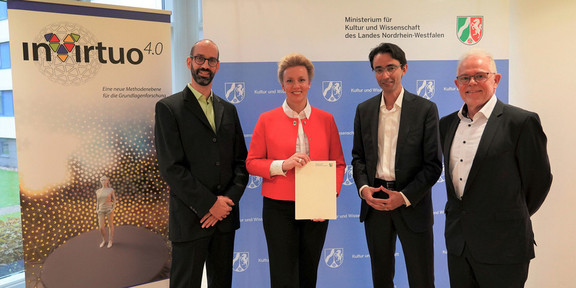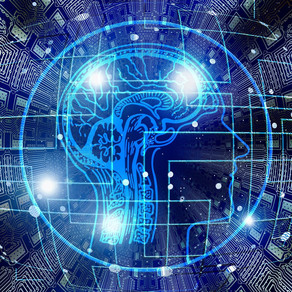Gaining knowledge in virtual spaces
- News
- Forschung

Researchers from Dortmund and Bonn are working together on an interdisciplinary basis in the state-funded "inVirtuo 4.0" project
With the joint project "InVirtuo 4.0", researchers in Bonn and Dortmund want to establish experimental research in virtual environments as a new interdisciplinary research profile. The project, which is funded with three million euros by the North Rhine-Westphalian Ministry of Culture and Science, brings together experts from the fields of computer science, media science, ethics, neuroscience, behavioral research and psychiatry.
The new research project will develop the latest technologies in the field of virtual reality (VR) as a tool for basic research in cognitive neuroscience, psychiatry and psychotherapy as well as clinical neurology. In addition to the University and University Hospital Bonn, TU Dortmund University and the German Research Center for Neurodegenerative Diseases (DZNE) are also involved in the project network.
Experiments in virtual worlds, i.e. "in virtuo", have been used for years in various disciplines such as behavioral and neurosciences and have already provided valuable insights and diagnostic approaches, for example in the fight against Parkinson's disease. The spokesperson of the project, Prof. Reinhard Klein from the Institute of Computer Science at the University of Bonn, explains: "However, such applications require both immense technological knowledge and comprehensive technical equipment. Our new research project InVirtuo 4.0 aims to close the gap between the latest technological developments and their application in basic and clinical research that is more remote from technology."
Confrontation with your own avatar
One focus of the project work will therefore be on the interdisciplinary training of young researchers who are familiar with both the technological and experimental aspects and can transfer the technology into application. One example of this is the "In Virtuo Mirror Exposure" for the treatment of body schema disorders in the context of anorexia or obesity. Patients are confronted with their fears using customized VR worlds that they enter via VR glasses. In a virtual mirror, they can manipulate their own reflection - their avatar - to simulate weight gain or loss. Initial studies indicate the potential of VR exposure therapy as an effective treatment approach. The challenge here is that the integration of technological development into the therapeutic process requires not only technical expertise, but also the ability to understand the needs and requirements of the experiment from a psychotherapeutic perspective.
With the "Visual Computing Incubator", which is also funded by the state, the project network has access to a globally unique hardware system. It can be used, for example, to measure digital twins, i.e. virtual images of any physical objects or people, in previously unattainable 3D quality; in future, it should be possible to depict minimal and particularly fast tremor movements in Parkinson's research, for example. Research is also being carried out into optimizing the reflective properties of such objects and people, particularly large objects and people in motion.
The rapid development and global spread of technical possibilities also raises serious ethical and social questions, as can be seen, for example, in the treatment of digital twins: The digital twin of a prominent personality could be misused in the virtual world to make false statements or be used for criminal acts that seriously damage the reputation of the real person. This raises questions about responsibility for the content generated and the protection of personal rights. Such ethical, legal and socio-technical challenges are at the heart of the investigations by experts in media studies and AI ethics who are part of the project team.
Joint model projects in the fields of clinical neurology, psychotherapy research and naturalistic game theory are intended to illustrate the transformative potential of in-virtuo research. "These projects form the basis for future collaborative research projects and ensure the long-term expansion of the new research area at the University of Bonn together with TU Dortmund University and the participating clinics and institutes ," explains Prof. Reinhard Klein, coordinator of the joint project.
Possible applications from movement disorders to psychotherapy
On the DZNE side, the research groups of Dr. Dr. Ahmad Aziz and Dr. Martin Reuter are involved in the project consortium. "As part of InVirtuo 4.0, our focus is on neurodegenerative diseases that are associated with movement disorders, such as Parkinson's disease and Huntington's disease," says Aziz. "Specifically, we want to investigate the connection between pathological changes in the brain and motor disorders. We will use virtual reality, deep learning, i.e. artificial intelligence, and data from brain scans to do this."
Prof. Alexandra Philipsen, Clinic Director of the Department of Psychiatry and Psychotherapy at the University Hospital Bonn, and Dr. Niclas Braun's "Virtual Reality Therapy and Medical Technology" working group are involved. The main aim is to develop new VR interventions for the characterization and treatment of mental illnesses using photorealistic, (mimic) animatable and morphologically adaptable avatars. The focus will be on improving self-perception and facilitating interpersonal interaction.
Virtual human models
For many of the virtual experiments, test subjects slip into an avatar - a photorealistic virtual copy of themselves, which they then perceive as their own body through the VR glasses. Prof. Mario Botsch, who heads the Chair of Computer Graphics at TU Dortmund University, is contributing the creation, animation and modification of these avatars to the project: "The Visual Computing Incubator will become a unique platform that will raise the quality of virtual human models to a new level and thus improve the effectiveness of the experiments."
Ina Brandes, Minister of Science of the state of North Rhine-Westphalia, explained at the launch of the funding that research such as that in the joint project "InVirtuo 4.0" would be given opportunities to network across different disciplines through the new "Freiräume für Wissenschaftlerinnen und Wissenschaftler" funding program. "This creates innovative ideas that make people's everyday lives easier," said Brandes. The concept is intended to strengthen the universities and research institutions in NRW in their profiling and networking. In addition to "InVirtuo 4.0", which is being funded from November 2023 to October 2026, nine other projects are also being supported.
Contact for queries:
Prof. Dr. Mario Botsch
Practical Computer Science VII
Phone: +49 231 755 6324 Otto-Hahn-Straße 16, Room 124

![[Translate to English:] [Translate to English:]](/storages/zentraler_bilderpool/_processed_/d/f/csm_Informatik_777f60dc25.jpg)

![[Translate to English:] [Translate to English:]](/storages/zentraler_bilderpool/_processed_/1/b/csm_Figuren-nachdenklich_0daa1f91f8.jpg)
![[Translate to English:] [Translate to English:]](/storages/cs/_processed_/6/f/csm_teamwork1_e113f5f13b.png)
